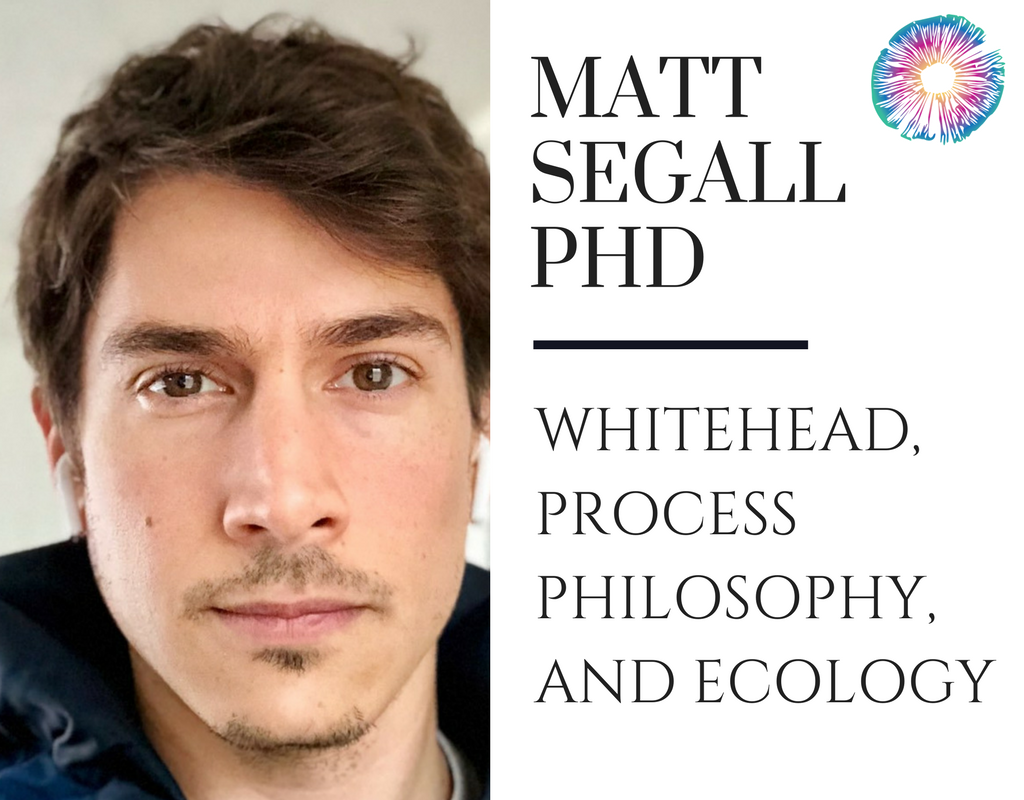
During this episode of Psychedelics Today, your hosts Kyle and Joe Moore talk to Dr. Matt Segall, a philosopher with a Ph.D. working at CIIS as an administrator and adjunct lecturer. In this episode, we explore psychedelics through the lens of philosophy and Alfred North Whitehead.

Show Notes:
- Philosophy is really important when talking about psychedelics.
- This movement is working on a lot of different levels.
- Looking to get accepted into academia therefore it’s important to be precise.
- About Dr. Matt Segall
- Strong interest in Alfred North Whitehead
- 12 levels of abstraction away from Plato.
- Ropes in all of western philosophy and science into a cohesive system that seems to reenchant the world a bit.
- Extended state DMT research
- Use an IV pump to keep a steady stream of DMT in the bloodstream for an undetermined amount of time.
- The initial phase of the study is 10-20 minutes.
- Not just for medical research, it’s for the community.
- Join the class at psychedelicstoday.teachable.com.
- How did Matt Segall stumble his way into the Whitehead world?
- Philosophy came first, but not by much.
- He had a teacher who introduced him to some psychedelic teachers.
- His first experience with psychedelics was when he was 19 years old with mushrooms.
- He realized that there were many other worlds running in parallel with this one.
- These substances open up our perceptions of other worlds and other facets of the same world.
- We need to incorporate the experience induces by these substances.
- Western philosophy is rooted in the psychedelic experience.
- Plato’s encounter with the ideal forms that led him out of the cave proves that the origins of philosophy include psychedelics.
- There is chemical evidence that the rituals in Athens were psychedelic in nature.
- When ancient Greeks refer to wine, they’re talking about something that was way more mind altering.
- What drew you into Whitehead?
- In college, he listened to a McKenna lecture and he mentioned Whitehead a lot.
- McKenna introduced him to Whitehead.
- He waited until he started graduate school, so he could take a course on him and study him alongside other graduate students.
- Whitehead incorporated 20th century physics and a version of Darwin’s understanding of evolution expanded to a cosmological level.
- Combining advanced science with an enchanted view of the universe.
- The modern era has alienated human beings from the rest of the natural world.
- The industrial revolution made this alienation even more profound.
- There has been a gradual isolation of the human being from the rest of life and the universe.
- Human beings have come to think of the rest of life and just robots seeking to reproduce.
- Value has to be assigned to anything non-human by humans.
- This thinking is highly destructive.
- Our idea has not fit the reality and it’s destroying the reality.
- Whitehead helps us re-inhabit the planet as one of the many species.
- When human beings come to recognize that value is not just made up in our human society but it’s an intrinsic cosmic value, they can act accordingly.
- Whitehead’s process is called a process-relational process.
- We’ve traditionally been thought to have a soul or mind that’s independent of others.
- Whitehead proposes that our soul or mind is in relation to others.
- So that what it means to be me is that I’m not unique, but my uniqueness comes from my unique perspective and works with the other souls in the environment.
- This attempts to move us away from thinking of ourselves as isolated minds.
- The biggest challenge is to get people to not shut down when they see Whitehead’s terminology.
- Philosophy can serve to help us develop a language that actually serves to represent our experience.
- It’s well worth it to learn the dictionary that Whitehead provides.
- Whitehead’s understanding of perception is welcoming more indigenous ways of knowing back into the realm of philosophy.
- Whitehead helps us make sense of indigenous experience.
- All of human culture stems from these shamanistic practices.
- We don’t yet have the words to explain yet what these psychedelic journeys are doing to us.
- A downside to being in the west is that we don’t have relationship with psychedelic substances.
- The plants that are a part of the ayahuasca brew told the indigenous people how to brew them.
- People talk about nature deficit disorder, kids being raised indoors being told the outdoors is dirty.
- The problem is not one of trying to reinvent the wheel, we have to stop beating this capacity out of children.
- When we talk about the human nervous system in the context of symbiotic relationships with our ecosystem:
- It doesn’t make sense to consider the human brain and nervous system as enclosed within the skull.
- The human nervous system is actually a lot more ecological in its extent than most physiologists would let on.
- The chemical metabolism of our brain extends out into the environment.
- Richard Doyle wrote a book called Darwin’s Pharmacy where he coins the term “ecodelic” which challenges the idea of an autonomous individual.
- The idea is we’re actually permeated by the chemicals flowing through our environment.
- Our consciousness is shaped any time we eat anything.
- Some drugs are not thought of as drugs: sugar, caffeine, tobacco.
- These are accepted psychedelic substances.
- The fact that cannabis and other psychedelics are becoming more mainstream again shows that we in late-stage capitalism.
- Is there anything in particular you’ve been excited about in psychedelics lately?
- The research on MDMA for PTSD in veterans coming back from Iraq and the success rate they’re achieving.
- The FDA may be forced by the sheer weight of the evidence to approve MDMA.
- The hope is that we can use MDMA to treat “pre-traumatic stress disorder.”
- Enhance the empathic capacity of those who handle a great deal of conflict.
- Within a year or two the FDA is going to be approving MDMA, which is unbelievable.
- Joe and Matt talk about how credentials are often forced as a barrier to entry into certain fields.
- Matt is all for a standardized approach to mainstream these things.
- He wants to go in all directions to get the therapy out.
- The plants used in psychedelics are so much safer than any drug that’s on the market right now.
- Some lawmakers are trying to pass a law to allow the death penalty for drug dealers, including those who sell cannabis.
- Do you have any places you’d like to send people to re-engage with philosophy?
- Study the history of philosophy.
- Passion of the Western Mind by Richard Tarnas.
- Story of Philosophy by Will Durant
- Matt teaches an online course on Whitehead, the next one begins in January 2019.
- Philosophy is not an abstract linguistic analysis.
- He approaches philosophy as a spiritual practice.
- Philosophy is learning to die.
- We’re embodied creatures and philosophy is a way to come to terms with that.
- Psychedelics help you experience ego death, but we’re still conscious.
- In college, he listened to a McKenna lecture and he mentioned Whitehead a lot.
Tweetable Quotes
- Psychedelics are not just theoretically interesting, they have profound practical implications for how we organize our lives.
- Whitehead’s terminology is an attempt to return us to our concrete experience.
- Philosophy is learning to die.
Resources Mentioned
- Psychedelicstoday.teachable.com
- Bluebird Botanicals
- Footnotes2plato.com
- Pharmakon – book by Michael Rinella
- Passion of the Western Mind – book by Richard Tarnas
- Story of Philosophy – book by Will Durant
- Introduction to Process Relationship Philosophy – book by Robert Mesle
- 0thouartthat0 – Matt’s Youtube Channel
About Matthew Segall, Ph.D.

Matthew T. Segall, PhD, received his doctoral degree in 2016 from the Philosophy, Cosmology, and Consciousness program at CIIS. His dissertation was titled Cosmotheanthropic Imagination in the Post-Kantian Process Philosophy of Schelling and Whitehead. It grapples with the limits to knowledge of reality imposed by Kant’s transcendental form of philosophy and argues that Schelling and Whitehead’s process-oriented approach (described in his dissertation as a “descendental” form of philosophy) shows the way across the Kantian threshold to renewed experiential contact with reality. He teaches courses on German Idealism and process philosophy for the Philosophy, Cosmology, and Consciousness program at CIIS. He blogs regularly at footnotes2plato.com.




